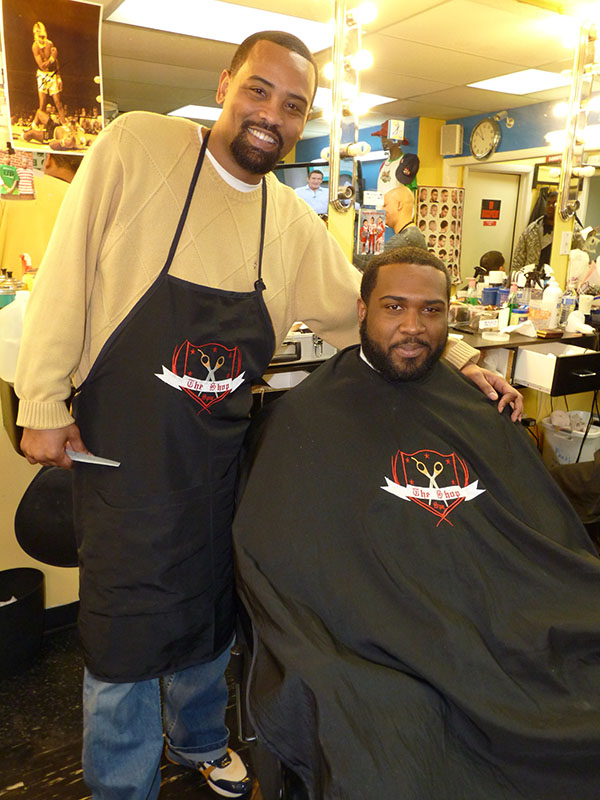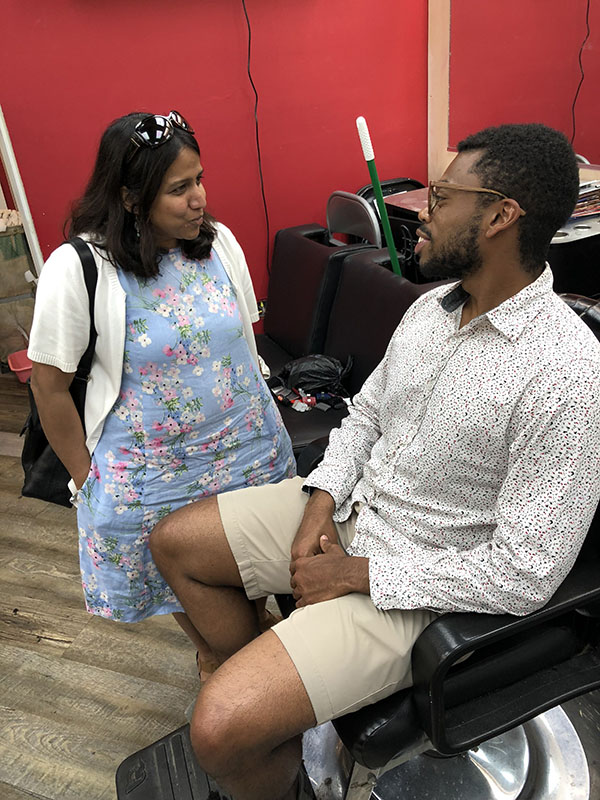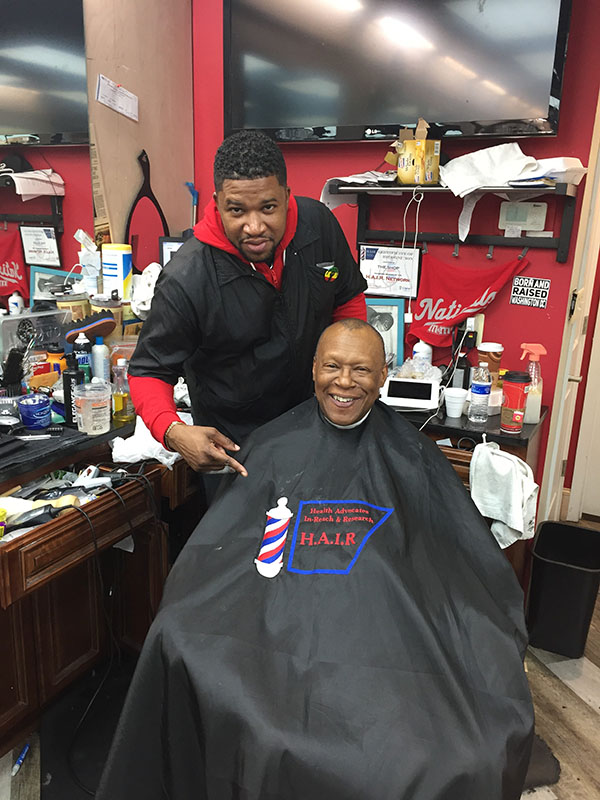Health from a Trusted Source: Barbershops Bring Health Services to African American Men

As a young kid training to be an amateur boxer, Michael Brown wanted to look good. His father grew tired of Michael asking for money for haircuts, eventually buying him a pair of scissors and clippers.
The first time did not go so well, but he just kept going and going until he got better. By the time Mr. Brown finished high school, he had a passion for cutting hair. Now he is a barber at a shop on a busy road in Hyattsville, Maryland, with a roster of loyal customers.
“You’re not just a barber. You’re a fashion consultant, you’re a marriage counselor, and any number of things,” says Mr. Brown. “If you have good information to give to the public, this is a perfect platform to do it, and I use it for just that.”
Mr. Brown is referring to his role as a health advocate in the Health Advocates In-Reach and Research (HAIR) program through the University of Maryland (UMD) Center for Health Equity. The Center was established as an NIMHD Center of Excellence for addressing health disparities.
African American men are less likely than others to visit a doctor, so many conditions are caught later, when they are much harder to treat or have caused problems. “African American men—we don’t tend to go to the doctor until our arm is all the way off on the floor,” says Mr. Brown. “I wanted to help other men be aware that they need regular checkups.”
Studies show that partnering with barbershops to deliver health information and services can improve African American men’s health. However, these studies generally look at just one or two conditions, and researchers often leave once the study is over.
Stephen Thomas, Ph.D., professor in the UMD School of Public Health and director of the Center for Health Equity, has a bigger vision: a national network of barbershops and salons, each partnering with a university and local hospital to address the health needs of their communities on an ongoing basis.
Transforming Health
The HAIR program is a step toward that vision. Soon after starting the Center for Health Equity in 2010, Dr. Thomas and his team of researchers reached out to barbers in the D.C. metro area, which includes Hyattsville. They created a network of eight barbershops and two hair salons in the HAIR program.
HAIR started by focusing on improving the barbers’ health and training them to talk to their customers about health. HAIR teamed up with local hospital systems, insurance providers, and specialty practices to provide health education training, health checkups, and more. By going through the experience themselves, the barbers became healthier and were better able to talk to their customers about things like health screening and insurance.
One of the first goals was to get more barbers screened for colon cancer. African American men are more likely than others to die of colon cancer. They are also much less likely to get screened even though more than half of colon cancer deaths could be prevented by screening. “It really hit home for me and is a major reason I got involved,” says Mr. Brown, whose father died in 2001 of colon cancer that spread to his pancreas despite many surgeries. “Seeing people change and becoming more healthy myself has been real great for me,” he says.
HAIR Expands Its Services
The team also asked barbers and customers about their health concerns and needs. Based on what they heard, the team has sent in doctors, pharmacists, and other specialists to do everything from conducting health screenings to answering questions about medications.

There was also a clear need for mental health services. To get men talking about their concerns, faculty and counselors from the UMD School of Public Health’s Department of Family Science had men draw the peaks and valleys in their lives, such as the birth of a child, a substance use problem, or gun violence, on a piece of paper. “Some of these men broke down in tears, because no one had really talked to them about this before,” says Dr. Thomas. “They asked if they could meet with the counselor again, and we realized the power of a trusted setting to engage Black men in conversations about anxiety and managing chronic stress.”
HAIR now rents private space at one of the anchor barbershops where the program pilots new activities and approaches.
Building Trust and Healthy Communities One Barbershop at a Time
In addition to having a higher burden of many diseases, African American men are less likely than other people to take part in medical research. That is a catch-22, since they need to be represented in studies in order to know whether a treatment or health solution will work for them.
Dr. Thomas spent much of his career studying how research abuses such as the Tuskegee Syphilis Study led to the African American community’s distrust of medical research. In that study, the men involved were not told that they had syphilis, a sexually transmitted disease, or given treatment when it became available. Dr. Thomas’ research showed how the legacy of the study hampered efforts to prevent the spread of HIV in the Black communit. According to Dr. Thomas, his work helped lead to Bill Clinton’s 1997 Presidential Apology to survivors of the study.

Yet HAIR shows a possible path forward in building trust and demystifying clinical trials research. Customers have agreed to complete social science surveys, sign up for clinical trials for obesity reduction, and even contribute urine or saliva samples for more basic research that would not directly benefit them. For example, one study compared the bacteria that live in the mouths of smokers versus nonsmokers.
According to Dr. Thomas, Black barbershops and beauty salons have a rich history in the United States. “It is important that we not only build trust but also be trustworthy,” he says. “Investigators need to check their unconscious bias at the door and do whatever is necessary to ensure barbers and customers feel comfortable.”
The HAIR team leaders learned this lesson the hard way when some investigators were glancing out the window to make sure their cars were still parked outside. “Barbers could feel their fear; it hung in the air like smoke,” Dr. Thomas says. With funding from NIMHD, the Center developed the “Building Trust Between Minorities and Researchers” training, which all investigators must go through before they can enter the shop.
HAIR: Coming to a Town Near You
Now Dr. Thomas is working on the next step in his vision. The UMD team recently spun off the nonprofit organization called the National Association of Black Barbershops & Salons for Health, Inc. The goal is to have a network of barbershops and salons all over the country to disseminate best practices and interventions for health promotion and disease prevention. The association will hold its first conference this year to bring together barbers, stylists, public health professionals, medical professionals, funders, and academic health science researchers.
Dr. Thomas believes his shared vision is a win-win scenario for everyone involved. The barbers feel like they are helping their community get care in a setting where their customers feel more comfortable and relaxed. Health professionals feel good about reaching a population they have not been able to before, and more African American men take part in clinical trials, so they are more likely to benefit from the results.
“Here’s what’s possible when you have the trust and address the needs that the barbers and clients have,” Dr. Thomas says. “Whenever I visit another city, I visit a barbershop, and all I hear is ‘When can we start?’”
Posted June 25, 2019

















